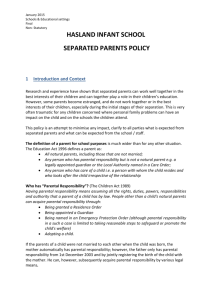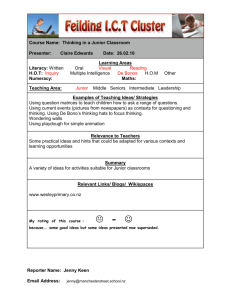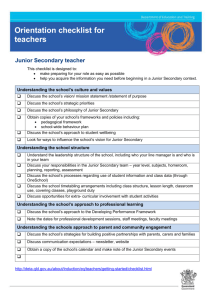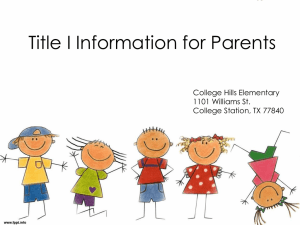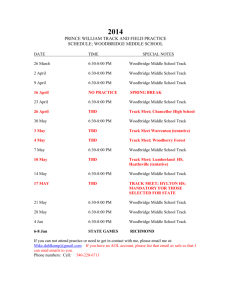Separated parents policy - Woodbridge Junior School
advertisement
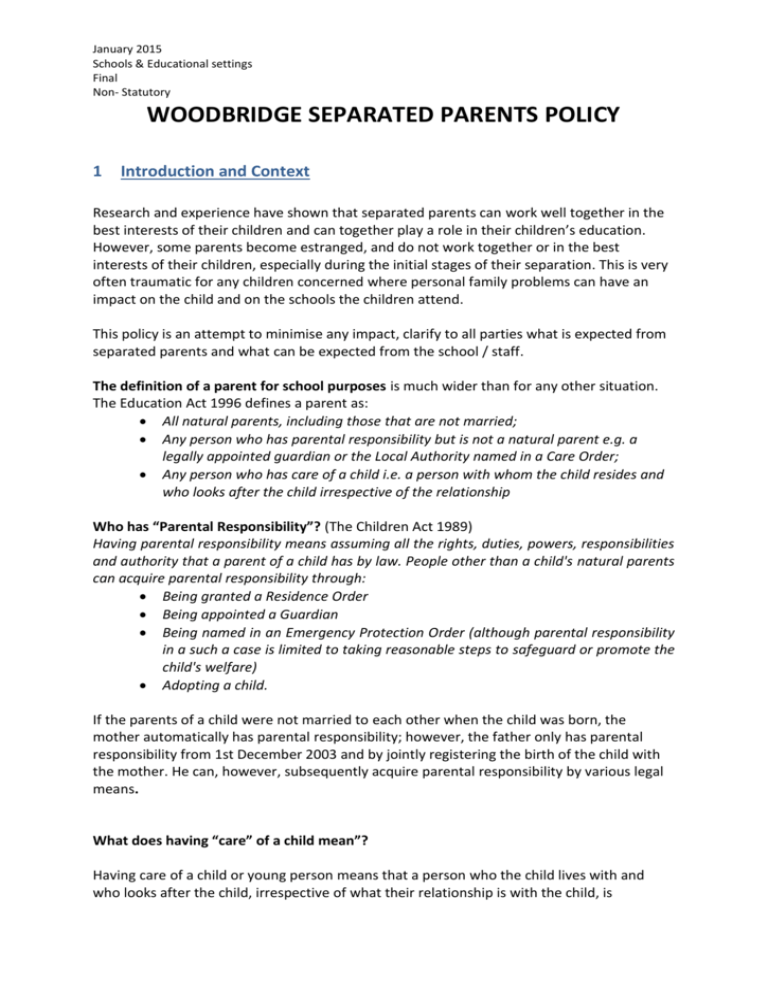
January 2015 Schools & Educational settings Final Non- Statutory WOODBRIDGE SEPARATED PARENTS POLICY 1 Introduction and Context Research and experience have shown that separated parents can work well together in the best interests of their children and can together play a role in their children’s education. However, some parents become estranged, and do not work together or in the best interests of their children, especially during the initial stages of their separation. This is very often traumatic for any children concerned where personal family problems can have an impact on the child and on the schools the children attend. This policy is an attempt to minimise any impact, clarify to all parties what is expected from separated parents and what can be expected from the school / staff. The definition of a parent for school purposes is much wider than for any other situation. The Education Act 1996 defines a parent as: All natural parents, including those that are not married; Any person who has parental responsibility but is not a natural parent e.g. a legally appointed guardian or the Local Authority named in a Care Order; Any person who has care of a child i.e. a person with whom the child resides and who looks after the child irrespective of the relationship Who has “Parental Responsibility”? (The Children Act 1989) Having parental responsibility means assuming all the rights, duties, powers, responsibilities and authority that a parent of a child has by law. People other than a child's natural parents can acquire parental responsibility through: Being granted a Residence Order Being appointed a Guardian Being named in an Emergency Protection Order (although parental responsibility in a such a case is limited to taking reasonable steps to safeguard or promote the child's welfare) Adopting a child. If the parents of a child were not married to each other when the child was born, the mother automatically has parental responsibility; however, the father only has parental responsibility from 1st December 2003 and by jointly registering the birth of the child with the mother. He can, however, subsequently acquire parental responsibility by various legal means. What does having “care” of a child mean”? Having care of a child or young person means that a person who the child lives with and who looks after the child, irrespective of what their relationship is with the child, is January 2015 Schools & Educational settings Final Non- Statutory considered to be a parent in education law. This could be shown by: Interaction with the school – attending meetings, making phone calls, being on the School’s record as being involved (in whatever capacity) etc. Residence with the child where, for all intents and purposes, the person is part of the family, a man or woman married to a parent of a child. For example: Are they listed on school records? Does the school have contact details for them? Do they meet with teachers/attend parents’ evenings? Have they been involved with the measures designed to improve attendance? Do they contact the school on behalf of the child when s/he is ill? Do they live with the child? How long has the school known of them being connected with the child? Does the adult bring/collect the child to/from school? Is the adult married to the parent of the child? It would not be appropriate to assume that someone having a “casual” relationship with the parent of a child necessarily has ‘care of the child’ unless we have cause to believe the person has some involvement with the child’s life – living with the child could be a determining factor as could the other examples outlined above. It is therefore those adults who are having significant input to a child’s life who can be classified as “parent”, having “parental responsibility” or who have “care of a child”. Parents as defined above are entitled to share in the decisions that are made about their child and to be treated equally by schools. In particular, these entitlements include: Appeal against admission decisions Ofsted & school based questionnaires Participate in any exclusion procedure Attend parent meetings/school events Have access to school records, receive copies of school reports, newsletters, invitations to school events, school photographs relating to their child and information about school trips. The Governing Body recognise that while the parents of some pupils may be separated they are entitled to the above and this entitlement cannot be restricted without a specific court order. In particular, the school does not have the power to act on the request of one parent to restrict another. The information provided to the school when the child was enrolled detailing whether parents have parental responsibility for the child will be presumed to be correct unless a court order or original birth certificate proving otherwise is provided to the school. January 2015 Schools & Educational settings Final Non- Statutory Similarly, the information provided on the address(es) where the child resides will be presumed to be correct unless a court order proving otherwise is provided to the school. 1.1 Our responsibilities Woodbridge Junior School fully recognises its responsibilities, and it is our sole wish is to promote the best interests of the child, working in partnership with all parents. Woodbridge Junior school will maintain our open door policy with all parents, and the class teacher and/or Head Teacher will be available by appointment to discuss any issues or concerns with regard to separated/divorce estranged parents may have in relation to their child or children at the school. Parents will be encouraged to resolve any issues around estrangement, contact and access to information without involving Woodbridge Junior School directly. Issues of estrangement is a civil/private law matter and Woodbridge Junior school cannot be involved in providing mediation, helping an estranged parent to communicate with their child or children, or using the school premises for purposes of contact. In the event that the parents are unable to agree with one another on decisions regarding their child’s educational programme, including but not limited to placement, participation in extracurricular activities, and consent to evaluation and services, the school will arrange a meeting with all parents (preferably together or separately if required) to attempt to assist the parents to resolve the situation; if it cannot be resolved the school may refer the matter to the relevant department of the Local Authority. The interests of the child will always be paramount when deciding whether to accommodate a request from an estranged parent. We recognise that a Court Order can restrict a parent in having contact/access to information and we may be bound by this. In this situation we will consult with the Local Authority to obtain advice as this may constitute a safeguarding concern. In any event whereby the parents been estranged is appearing to impact upon the health, wellbeing and safety of a child the matter will be referred to the Local Authority for advice. 1.2 Our Policy It is the responsibility of the parents to inform Woodbridge Junior School when there is a change in family circumstances. The school needs to be kept up to date with contact details, arrangements for collecting children and emergencies. January 2015 Schools & Educational settings Final Non- Statutory We encourage parents to tell us at an early stage if there is a change in family circumstances. Whenever possible, staff will be informed of such changes so that suitable support can be offered. We will, however, recognise the sensitivity of some situations and maintain the level of confidentiality requested by parents as far as possible Newsletters & general school updates can be sent to all parents via (website and child). These updates will contain all the main events within school, Including; productions, sports days, parent’s evenings, class trips, etc. Occasionally letters are sent to individual classes. We would expect parents to communicate these messages to each other as and when appropriate. We will hold parent evenings in the autumn and spring terms we would expect parents to communicate with each other regarding these arrangements. Woodbridge Junior The school will consider separate appointments but by prior agreements only or when a court order is in place restricting contacts with both parents. We expect that parents should liaise and communicate directly with each other in matters such as the ordering of school photographs; tickets for performances and other instances. A parent as defined in this policy has the right to receive progress reports and review pupil records of their children. If the parents are separated or divorced, progress reports will be sent to the parent at the address in the school’s records specifying where the child resides with the expectation that he/she will share the report with the other parent. If the child is subject to a joint residence order and the school’s records formally capture that the child resides at two addresses, then progress reports will be sent to both addresses. The school will send copies of the progress reports to a parent with whom the child does not reside only if that parent submits a written request. In the matter of the release of a child or children: Woodbridge Junior School will follow the standard agreed procedure in the release of a child or children. In the case of separated parents Woodbridge Junior School will release a child or children to a parent in accordance with any specific arrangements notified to the school. If one parent seeks to remove the child from school in contravention of the notified arrangements, and the parent to whom the child would normally be released has not consented the following steps will be followed: The Head Teacher, designated deputy or Safeguarding Designated Lead will meet with the parent seeking to collect/remove the child and, in his/her presence, January 2015 Schools & Educational settings Final Non- Statutory telephone the parent to whom the child would normally be released and explain the request. 2 If the parent to whom the child would normally be released agrees, the child may be released and the records will reflect that the permission was granted verbally. In the event that the parent to whom the child would normally be released to cannot be reached, the Head Teacher or staff member dealing with the issue may make a decision based upon all relevant information available to him/her. The Head Teacher or staff member may have to refuse permission if agreement/consent cannot be obtained and may need to take advice before a child or children are collected / released. Woodbridge Junior school cannot prevent the other parent collecting the child or children but we will endeavour to reach an agreement and this may mean keeping the child or children safe whilst (insert school) try and reach such an agreement. If there is a Court Order restricting contact or it is in contravention of any access agreement, the child or children will not be released into their care and the other parent advised to take the necessary action which does not involve the school. During any discussion or communication with parents, the child or children will be supervised by an appropriate member of school staff in a separate room. In circumstances if there is a belief that a possible abduction of the child may occur or if the parent is disruptive, the police should be notified immediately and the Local Authority notified. Management of the Policy The Head Teacher/Safeguarding Designated Lead(s) will familiarise themselves with this policy and ensure all Staff, Governors and Volunteers are aware of the procedures to follow should the need occur. The policy will be made available to parents and published on our school website Signed by: Signed by Head Teacher Chair of Governors Date: Date:
